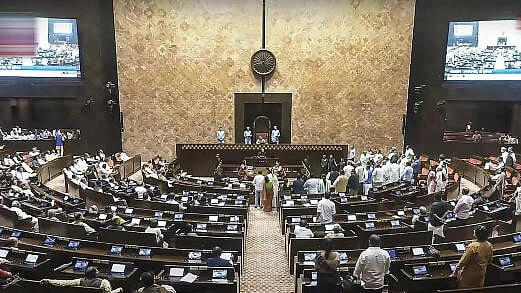New Delhi: Two weeks have gone by, but the Joint Committee of Parliament to examine the contentious Bills for removal of top political executives detained in jail for at least 30 days in a row is yet to be set up, amid four parties announcing their boycott and some Opposition parties yet to give names.
This is in contrast to the speedy constitution of the JPCs on the Waqf (Amendment) Bill, 2024, the Constitution (129th Amendment) Bill, 2024, and the Union Territories Laws (Amendment) Bill, 2024, seeking simultaneous elections to the Lok Sabha and state Assemblies.
Seeking the removal of prime minister, chief ministers, and ministers if they remained in custody for 30 days in a row, the Constitution (130th Amendment) Bill, the Jammu and Kashmir Reorganisation (Amendment) Bill, and the Union Territories Administration (Amendment) Bill were introduced in the Lok Sabha on August 20 and referred to a JPC, but without the names of members. A motion to nominate Rajya Sabha members was moved a day later.
The announcement on the panel’s members has not been made so far in the Parliamentary bulletins, amid the Trinamool Congress, Samajwadi Party, AAP, and the Shiv Sena (UBT) announcing that they would not join the committee because the Bills were being used as a “political weapon”.
Sources said the Congress had not sent any communication to the Lok Sabha Secretariat on joining the JPC, amid divergent views within the party and in the I.N.D.I.A bloc. The RJD, which has not publicly announced its decision, appears disinclined to join the panel.
Congress sources maintained that the issue was under “active consideration”, with the leadership weighing the arguments for and against participating in the deliberations. One of the main concerns was that joining the panel would mean snubbing other I.N.D.I.A-bloc partners.
A senior Opposition leader said discussions were continuing with parties, and that they would take a “united” decision. The leader, however, cited the Opposition’s consistent demand for sending Bills to Parliamentary panels and wondered how they could justify the boycott.
A section in the Opposition is citing how its dissent notes on the Waqf Bill played a role during court hearings, while others claim that joint committees have lost their purpose under the BJP.
Sources also cited the Opposition boycotting the JPCs probing the Bofors scandal, claiming the panel was packed with Congress MPs.
